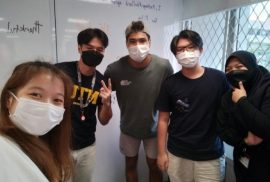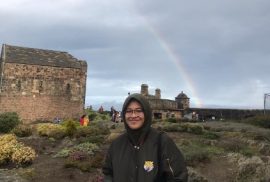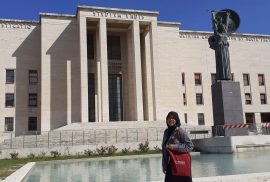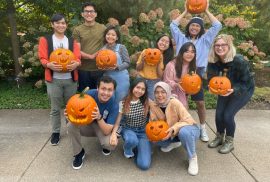Waking up in a room with a view of yellowing and reddening trees would have been my wildest dream until a year ago. Every new thing that I have experienced from last year’s September until December is the result of sleepless nights and staring at my laptop for four months. IISMA truly gave me the chance to taste my childhood wish, and I could never be more grateful than I am today. As this is one of my biggest milestones, I cherish every second that I spend in Dublin, Ireland, and make sure to engrave all passing moments in my mind–probably in my phone’s gallery as well. I am Konan, and here is a glimpse of my life as an IISMA awardee in University College Dublin.
IISMA
The past four months might have been the best four months of my life. Indonesia International Student Mobility Awards has given me a chance to study at one of the most prestigious universities in the world, Nanyang Technological University, in Singapore. I made some good friends, learned new lessons in both classes and in life, and created beautiful memories that are worth cherishing in the Lion City. Here are some stories of my life in Singapore!
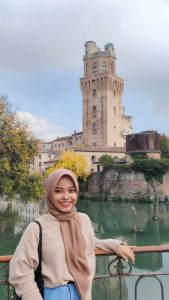
For the first few days of my arrival, I still could not believe my eyes that I had finally made my way there. Going abroad for an exchange program has always been the biggest dream of mine and all struggles in the pre-departure preparation were paid off. Italy, specifically the University of Padua, however, was not my first destination. My first choice fell to Newcastle University, London. After learning that they did not accept TOEFL ITP, the only English proficiency certificate that I had, there was not much time left to take another type of test, so I decided to change my choice on the host university. After many considerations including the local language and offered courses, I was convinced that University of Padua was the best option for me. I did not regret it one bit.
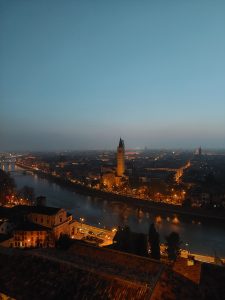
I, along with the other 29 awardees, lived in the same dorm building. It was only around two kilometers away from the city center. Since everything was relatively close, I usually commuted by bus or simply on foot. Italy, to my surprise, had more things in common with Indonesia than I had expected, which is a good thing because it truly made it feel like home. The locals were very friendly and helpful even when I did not speak and understand Italian whatsoever at first. I’d have random locals start sharing their trip experiences in Indonesia with me as soon as they learned I’m an Indonesian.
Being a Muslim was not as scary as I thought it would be either. If anything, I can say that most people respect it, though Islam belongs to the minority group and thus there were barely any mosques in my city. Some local women even came up to me to compliment my hijab and how I looked good in it. Also when eating in a restaurant, they would warn me if the food contained pork. However, I can admit that my options for halal food were very slim, which forced me to cook more. One thing that caught my attention was the lack of time discipline. Surprisingly, just like Indonesian culture, it was much more common for people not to be punctual. There were many times when my professors would start the class five to ten minutes late and the buses did not operate as scheduled.
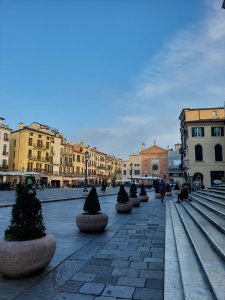
My academic life was not any less interesting. Because of the pandemic, the classes had to be conducted partially online and physically. However, attendance was not mandatory for most courses. Students would still be given the opportunity to take final exams even if they chose to be non-attending students but with different workloads. The teaching methods seemed to vary from one course to another. There was one course in which the professor barely gave lectures and thus only demanded the students to be actively engaged in class forums and discussions. Meanwhile, in a different course, the professors were the ones leading the class with lectures. Also, some courses barely gave any assignments and even midterms. Hence, final exams contributed 100% to our final marks.
Most humanities fields held the final exams orally, which I struggled with at first since I was more used to paper-based exams. I even failed one of the courses once. Thankfully, I was able to retake the exam the following month and passed it with a satisfying result. They also allowed us to reject our marks and gave us chances to retake the exams more than once should we were not satisfied with the results. The grading system was also different from that in Universitas Gadjah Mada. The marking system was on a scale of 18 to 30, with 18 being the minimum passing score and 30 being the maximum. It was definitely not an easy job to get a good mark. My local friend informed me that it was common for her peers and herself to retake the exams at least three times before getting a score above 26. But, since I was in a short exchange program, it was impossible for me to retake the exams more than once. Therefore, I was highly motivated to make up for the failing exam by trying my best in the next period.

The international office staff member was also accommodating us from the pre-departure up to the return, including informing us on how to fill out the study plan, apply for the residence permit, and other useful academic-related life. I had to change some of the selected courses because of the overlapping timetables. It took me a while to commute from one class to another because unlike Universitas Gadjah Mada, the faculties of the University of Padua were not centralized in one area. Some of them are even located in a different city that is like an hour away by bus from the city center.
IISMA gave me the opportunity to meet people from various backgrounds and learn about new cultures not only through social events that I participated in but also by traveling to other EU countries since I was the holder of a European visa. I met and interacted with other Indonesians who resided in those countries. They got to share their experiences living abroad as Indonesians, which also motivated me to do the same in the future.

My ups and downs during IISMA have had a strong impact on my life. Though it was a relatively short period of time, I never went a single day without learning something new. Most importantly, it taught me to be independent and solve problems on my own. The gap between the Eastern cultures in which I grew up and the Western cultures to which I was exposed to has given me a new perspective to see the world. It is important to have pride in our identity while also maintaining respect for others. I hope that everything I learned from my five-month stay in Italy will be a valuable tool that will assist me in my future academic journey.
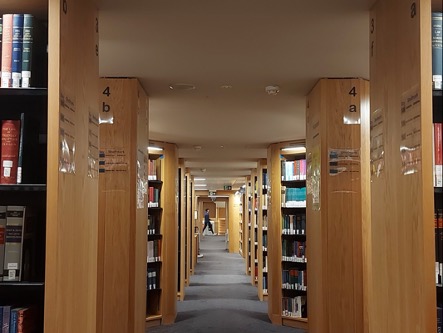
Regarding academic life, there are several things I had to consider. In terms of reading, I had to read a lot of material from different books for one meeting in a course. In Indonesia, spesifically Universitas Gadjah Mada, it is not common to read many pages of one book for a course, let alone hundreds of pages from several different books. This was what happened when I joined the program. Besides, I had to be really independent in terms of studying at the University of Edinburgh. Instructions and reading lists were usually given before all classes started. We are supposed to have understood the system of study so that when the classes have started, we should have understood everything relating to the courses. All things relating to things such as tutorials, the marking system, and assignments should have been at our fingertips. This surely forced me to adapt myself to the system quickly and became one of the stressors, so to speak, that I found in the program. Furthermore, the marking system may put Indonesian students into a problem as the system employed in the UK universities is more complicated. What I did find surprising was the way that the university in the UK is very attentive to the student’s well-being, especially their mental health. GPs or General Practitioners are available everywhere, including in the university, and it is very easy for us students to get access to one. The university also provides each student with a personal tutor. We can ask them anything and they will help us in any way they can.
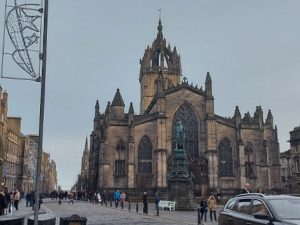
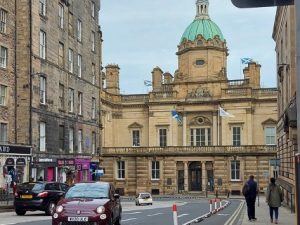
Edinburgh for me is like Jogja, a small city but full of culture. There are almost always men wearing kilts down the streets and playing the traditional Scottish instrument, the bagpipe. The buildings are old vintage buildings, like ones you would find in the Harry Potter movies. As for the weather, it is very unpredictable. One minute it was sunny, the next it would rain. It was also always freezing cold. The joke says that the UK has four different seasons, but for us Indonesians, it may have only two seasons, namely cold and very cold seasons.
As expected, living in Edinburgh is expensive, especially food-wise. Local supermarkets like Lidl and Aldi might be a good choice to shop in since they are affordable. This way, we have to spend money wisely as the funds supporting us were only enough to survive. Takeaways are the biggest problem since there are so many near the university yet they are expensive. One takeaway meal could cost the equivalent of one week of groceries. As a Muslim, it is also important to read the ingredients of something before buying it, because not everything is halal, even though it is pretty easy to find halal food. Foods are much blander compared to foods in Indonesia, which is another reason why I prefer cooking rather than eating out. Thank God I had brought a lot of spices!
When we are living in the UK, we have the experience of getting along with a different culture and people, as well as how to behave in such situations. When I was living in Edinburgh, I had three flatmates: two from the UK and one from Australia. I had to speak English all the time. As we were living under the Western culture, the celebrations that we had were related to the culture. For instance, in December, we celebrated Christmas. Yet I did not have to join the celebration except when my friends had a non-religious party. At the party, there was some food that we could share. So, I joined the celebration that I thought was not problematic to my religion. I began to control what to join and what to not join. As regards partying, it can happen two or three times a week or sometimes more as it is considered a social event. At the party, people drink and socialize too. It is a great way to make friends.
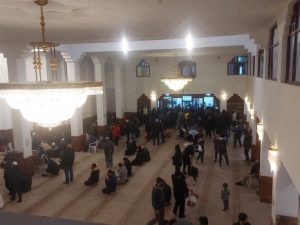

Regarding the Muslim society in Edinburgh, it consists of two groups: students and common people that live there. There is one central mosque near the university where men and women attended the prayers every day, even the Jummah prayers. This is different from Indonesia where women mostly stay at home to pray. To me, this mosque reminded me of home and I felt the safest when I was here. At the University of Edinburgh, there is an Islamic Society that I joined. The members are Muslim students from all over the world. Events such as having dinner together and game night were held by the Islamic Society with the purpose that Muslim students from different backgrounds and nationalities would get along closely. This is to help them with loneliness and homesickness so that they have a community and family.
From my experience of living for three months in Edinburgh as an exchange student, I now can make up my mind about my life. Living in a different culture will open your mind about differences and how to handle them. In the UK, people are tolerable. They will appreciate your ideas, religion, ways of thinking, and culture. In this way, they can accept people from different backgrounds and nationalities. So, we do not have to worry about showing our national identity. Besides, in terms of studying, we need to work hard because the systems are relatively harder than that in Indonesia. Knowing the complete system of education in the UK is necessary for our success in the future. Apart from that, we also have to be able to manage our social life, so that we can get along with people from different backgrounds and cultures. I do hope this very short time in Edinburgh will prepare me for when I study for my higher degree there in the future.
During my studies, I have always known that I am drawn into the humanities. However, the choice to delve deeper into it wasn’t always available. While I was already satisfied learning fractions of the humanities in English literature, I know that many elements from pure humanities will really contribute to my seeing of the big picture. Therefore, when I was choosing my host university for IISMA, I didn’t have many things to consider; I chose the university that provided the courses that I wanted to study. When I got accepted, there were many things that hindered me, such as unavailability of the courses that I wanted or the clashing timetables. However, I still obtained the majority of what I came there for, and it was such a great experience.
I am extremely grateful for the courses that I took in Sapienza University. I never imagined that I would study Gender Economics at any point in my life, but it turned out to be a really interesting subject to learn. Many famous scholars in the field of gender economics came to the course as guest lecturers in seminars, and their insights on the field contributed to my understanding of the status quo of gender equality. I also learned under the chair of the Global Humanities department in her Critical Theories course, and needless to say I gained comprehensive knowledge on various academic theories that I can apply even in the courses of the English Department at UGM. As silly as it sounds, I finished my study in Sapienza University believing that I could really pursue a degree in the Global Humanities.
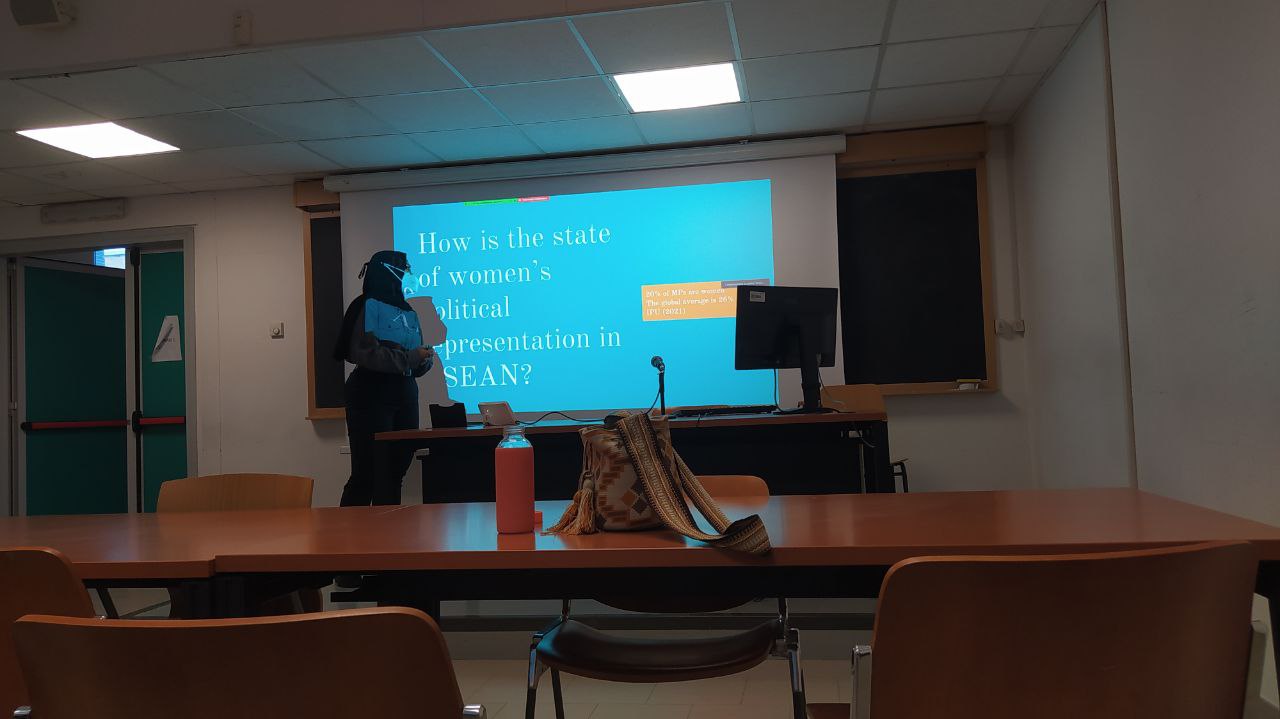
In Italy, many lecturers emphasize the need for oral exams in gauging their student’s understanding of the materials. It will be extremely common to see you or your peers failing exams here and there, but fortunately there’s always another opportunity to make-up for bad scores. Personally, going from studying with paper-based output to one with producing a spontaneous oral end-product is a very demanding chore on my end, as I have to change my whole routine of facing exams and exercises. However, I learned a lot from actually practicing this: my presentation and public speaking skills have grown tremendously better from what it was before. I learned how to communicate my thoughts in a way that my audiences would understand best. The lecturers also taught me that failing an exam isn’t the end of the world; they give you constructive feedback, and would gladly encourage you to attempt another one at a later date.
As I navigate through life in Rome, I am very grateful that I befriended people who are there to have fun with me or assist me whenever I face difficulties. Having friends that are local and international helped me to gain insights from two different viewpoints: my local Italian friends help me get immersed into the Roman lifestyle and taught me the Italian language, while my international friends are there for me to experience new things in the city together. I find people who live in the Mediterranean area to be very warm and welcoming, and I am glad that Italy serves as my entryway when experiencing life in Europe. I think of the connections that I created with my friends in Italy to be real ones, and they have unknowingly become one of my motivations to come back when I have the opportunity to pursue my study in the area.
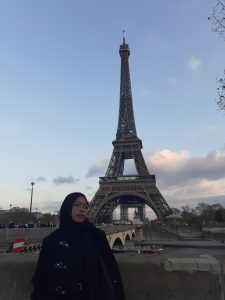 Socializing with my friends became a really positive experience for me. People that I met, most of the time, come from different cultural backgrounds. It had sort of become a habit for me to ask people where they came from when we first met and vice versa. From there on, the conversation would involve the exchange of cultural information: I get to share with them about Indonesian culture, and they would also share with me bits of their own. I find this process really amazing and it definitely has contributed to my current worldview. From IISMA, I get the chance to experience not only Roman culture, but also culture from other countries: my Brazilian friend would host me for dinners, my Pakistani friends would brew me their traditional tea, or my Filipino friend would watch Filipino movies with me. To me, all of these are extremely endearing moments where I can appreciate cultures from various places I have never visited.
Socializing with my friends became a really positive experience for me. People that I met, most of the time, come from different cultural backgrounds. It had sort of become a habit for me to ask people where they came from when we first met and vice versa. From there on, the conversation would involve the exchange of cultural information: I get to share with them about Indonesian culture, and they would also share with me bits of their own. I find this process really amazing and it definitely has contributed to my current worldview. From IISMA, I get the chance to experience not only Roman culture, but also culture from other countries: my Brazilian friend would host me for dinners, my Pakistani friends would brew me their traditional tea, or my Filipino friend would watch Filipino movies with me. To me, all of these are extremely endearing moments where I can appreciate cultures from various places I have never visited.
IISMA has also given me the chance to travel to places I could have only dreamed of before. As the holder of the national visa of a European country, I have the permission to travel around the entire area. This has been a very precious opportunity for me as I get to visit notable museums and monuments. Furthermore, through PPI, I got to befriend several Indonesians living in different European countries I visited. I learned so much from their experiences, and since they live there as the fruit from their academic endeavors, they really inspired me to achieve more in my studies.
My experience at IISMA wasn’t always pleasant; there will be moments where things go a little bit rocky and I have to depend on myself to solve those problems. I have also realized the limitations that I have as a foreigner who stays short-term compared to people who have settled for a long while in the area. Sometimes, it feels as if I am required to learn what I was supposed to learn in a year in the compact timespan of five months. Despite all of that, it is enough for me to be aware that I have grown tremendously from the person I was before IISMA. I believe that this change is for the better. IISMA has delivered me closer to my goals, big or even small ones. And for that, I will be forever thankful.
Studying in Ireland through IISMA was a lot of firsts for me: first time going away from home for a long period of time, first time going overseas, and first time studying abroad. Aside from now having something to casually flaunt about during family reunions, there are many perks and rewards that come with it. They can be divided into three categories: education-wise, soft skills, and personal experiences.


